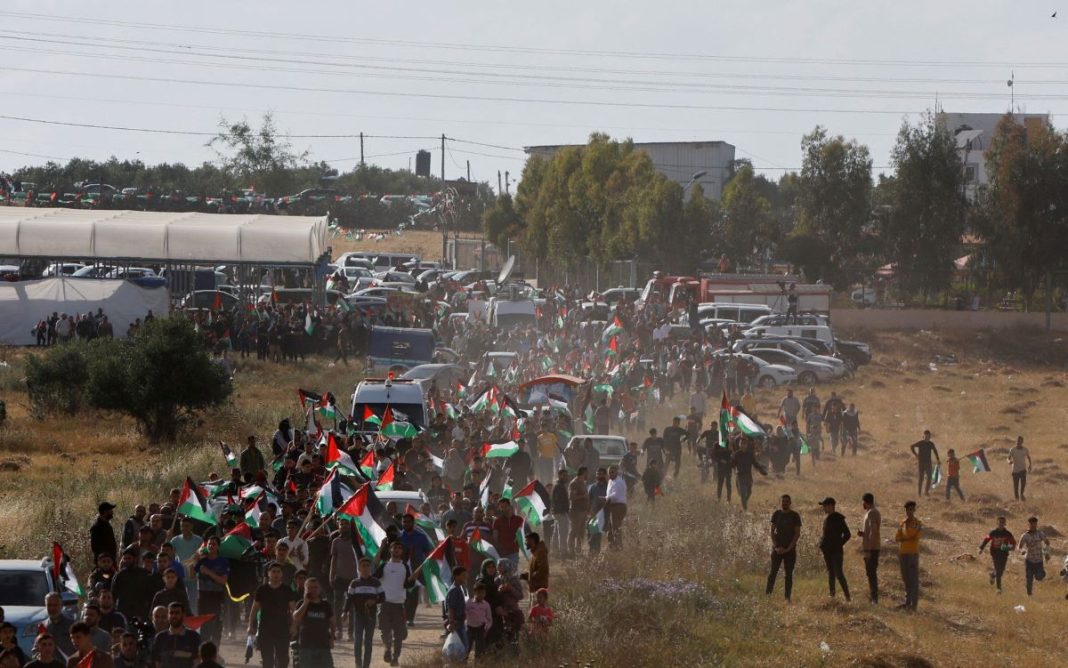Hundreds of Palestinians joined the protest on Thursday, which was called for by Palestinian factions in response to the Israeli march. The Gaza demonstration condemned the ‘flag march’ in Jerusalem, and called for an end to Israeli attacks in the Al-Aqsa Mosque compound.
Israeli authorities said their forces had fired after Palestinians threw explosive devices at the barrier between Israel and Gaza.
Osama Abu Qamar, a 50-year-old resident of Gaza’s Jabaliya camp, told Al Jazeera that he had come to participate in the march to protest against the “provocative” march in Jerusalem, where far-right Israelis forced the closure of several Palestinian throughfares in the city as they chanted abusive slogans and waved Israeli flags.
The event, which is held annually to mark the occupation and annexation of East Jerusalem, has led to violence in recent years, and with a truce between Israel and the Palestinian Islamic Jihad only coming into effect this week after four days of fighting that killed 33 Palestinians and one Israeli, there was fear of it sparking further violence.
“We will not surrender and we will continue to demand our rights and defend our occupied lands and our sanctities in Jerusalem,” Abu Qamar told Al Jazeera.
Huda al-Salibi attended the march with her family.
“A few days ago, the Gaza Strip was under an Israeli attack that lasted for days in an attempt by the Israeli government to implement racist policies by [far-right National Security Minister Itamar] Ben-Gvir and other extremist ministers,” al-Salibi told Al Jazeera, adding, “Today, the violations in Jerusalem continue with the launch of the provocative march.”
Israel deployed heavy security to prevent violence after past flag marches were marked by Israeli attacks on Palestinians and “death to Arabs” chants.
In 2021, the march was rerouted after violence erupted in the wake of the storming of the Al-Aqsa Mosque compound, Islam’s third holiest site, by Israeli forces and the evictions of Palestinians from the Sheikh Jarrah neighbourhood, also in East Jerusalem
Hamas, which governs Gaza, called on international and Arab governments to stop the provocative flag parade in Jerusalem, warning that it would lead to further escalation in the coastal enclave, which has been under an Israeli air, sea and land blockade since 2007.
Abd Allatif al-Qanou’, a spokesman for Hamas, told Al Jazeera: “We will not allow Israeli occupation to pass a plan to extend its sovereignty or impose its control over Al-Aqsa Mosque through facilitating the march of the settler flags or the repeated incursions into it.”
“We call for all Palestinians to go to Al-Aqsa to participate in the defence of the compound in order to protect it and to confront the occupation,” he stated.
Al-Qanou’ accused the Israeli government of using what has become known as Jerusalem Unification Day to encourage, facilitate and protect the frequent storming on Al-Aqsa Mosque by Israeli settlers. The latest occurred on Thursday morning in the run-up to the flag march and was led by Israeli ministers and Knesset members.
“This disgraceful behaviour represents a flagrant violation of our greatest religious symbols, our Islamic sanctities and our sacred capital,” he added.
The leftist Popular Front for the Liberation of Palestine (PFLP) announced in a statement that the Palestinian people and their resistance “will not be silent in the face of the so-called march of flags and the [Israeli] occupation’s repeated incursions of Al-Aqsa”.
“We call for urgent action to condemn these occupation policies and attacks against the Palestinian people, their rights and sanctities,” said the PFLP, which has presence in both the occupied West Bank and Gaza.
Reham Owda, a Gaza-based political analyst, told Al Jazeera that Palestinians consider the flag march a provocative attempt by settlers and the far-right government of Israeli Prime Minister Benjamin Netanyahu to change the status quo in occupied East Jerusalem by “Judaising” it and exerting its control on the Old City.
Palestinians fear Israel has gradually been expanding its control over the Al-Aqsa compound, where Jews are not supposed to be allowed to pray.
The international community backs the so-called two-state solution to resolve the Israeli-Palestinian conflict, but successive Israeli governments have approved settlements in the occupied West Bank and East Jerusalem, which is supposed to become the Palestinian state’s capital. Palestinians say the expanding settlements diminish the prospects for a viable, sovereign State of Palestine.
